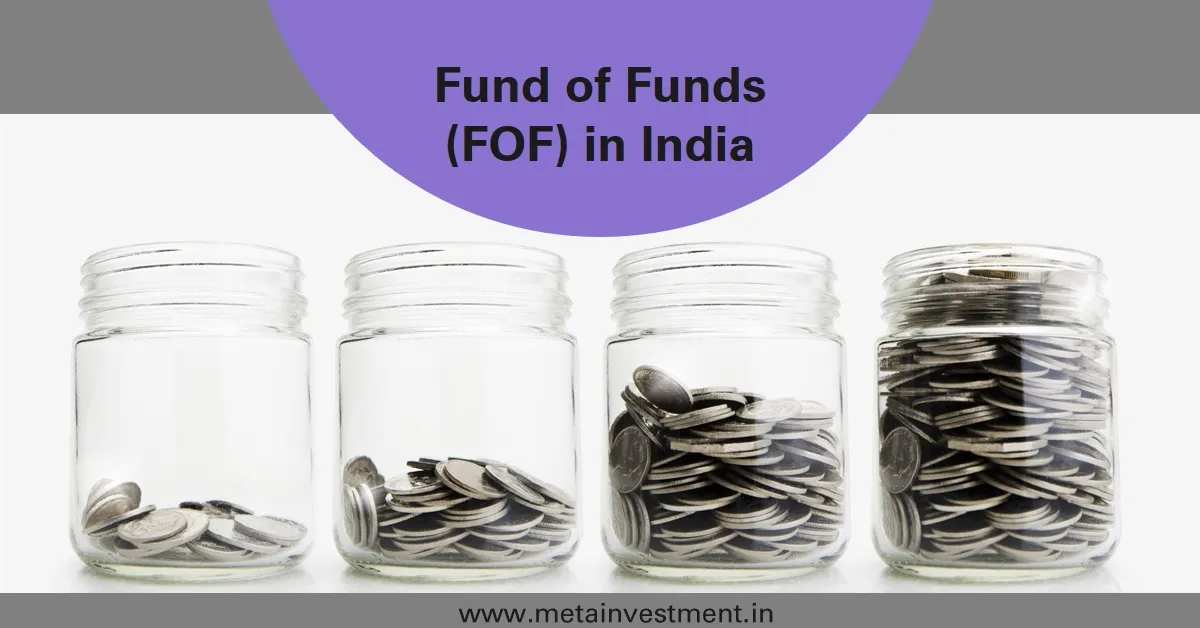Tired of picking multiple mutual fund schemes like you’re grocery shopping? Want a diversified investment portfolio without the hassle of being a chef? Imagine a “meal kit” for your money, with pre-selected ingredients perfectly blended for flavor and nutrition. That’s the magic of Fund of Funds (FoFs) – your shortcut to effortless investing.

What are FoFs?
Fund of Funds (FoFs) are mutual funds that don’t directly invest in stocks or bonds. Instead, they invest in a basket of other mutual funds. This means you’re essentially buying a portfolio of different portfolios.
How Do FoFs Work?
-
Diversification: FoFs spread your investments across various asset classes (e.g., equity, debt, gold) and different fund categories. This helps reduce risk as your money isn’t tied to the performance of just one fund.
-
Professional Management: Fund managers of FoFs are experts in selecting and managing a diversified portfolio of funds. This saves you the hassle of researching and tracking multiple investments yourself.
-
Convenience: FoFs provide a one-stop solution for investors looking for exposure to different asset classes and fund categories.
Who Should Invest in FoFs?
-
New Investors: FoFs are a great option for beginners who lack the knowledge or time to research individual mutual funds.
-
Investors Seeking Diversification: If you want to spread your investments across different asset classes and fund categories, FoFs can be a convenient way to achieve this.
-
Investors with Low Capital: FoFs allow you to access a diversified portfolio with a smaller investment amount compared to investing in multiple individual funds.
Types of FoFs
-
Asset Allocation FoFs: Invest in a mix of equity, debt, and gold funds based on a pre-determined allocation.
-
Gold FoFs: Invest primarily in gold ETFs (exchange-traded funds).
-
International FoFs: Invest in overseas mutual funds to provide exposure to global markets.
-
Domestic FoFs: Invest in a variety of Indian mutual fund schemes.
Things to Consider Before Investing
-
Cost: FoFs typically have higher expense ratios than regular mutual funds due to the additional layer of management.
-
Taxation: FoFs can have complex tax implications depending on the underlying funds they invest in.
-
Performance: The performance of an FoF depends on the performance of the underlying funds it holds.
Taxation of Fund of Funds (FoFs)
The taxation of Fund of Funds (FoFs) in India depends on the type of underlying investments it holds.
Equity-Oriented FoFs
- If an FoF invests at least 90% of its assets in units of listed equity ETFs (Exchange Traded Funds), it qualifies for equity taxation. For example, an FoF investing primarily in Nifty 50 or Nifty 100 ETFs would fall under this category.
- Equity funds enjoy preferential tax rates:
- Short-term capital gains (held for less than 12 months) are taxed at 15%.
- Long-term capital gains (held for 12 months or more) above Rs.1 lakh are taxed at 10%.
Other FoFs (Treated as Debt Funds):
- Even if an FoF invests in actively managed equity funds, it is considered a debt fund for tax purposes. This is because the underlying units of these funds are not listed on stock exchanges.
- International FoFs also fall under this category as the underlying indices are not listed in India.
- Debt fund taxation is less favorable:
- Capital gains, regardless of holding period, are added to your income and taxed at your applicable income tax slab rate.
Some Examples FOFs
Domastic Equity oriented FOF
ICICI Prudential Thematic Advantage Fund (FOF)
This fund actively selects themes expected to perform well in the current market and dynamically adjusts its allocation among different thematic mutual funds. If you want to benefit from thematic investing but lack the expertise to time your entry and exit points, this fund could be a good way to gain exposure to these themes.
Allocation to different funds by this FOF as on May 2024:
| Equity Mutual Fund | % to NAV |
| ICICI Prudential Pharma Healthcare and Diagnostics (P.H.D) Fund | 26.10% |
| ICICI Prudential Banking and Financial Services Fund | 25.82% |
| ICICI Prudential Bharat Consumption Fund | 20.10% |
| ICICI Prudential Technology Fund | 13.38% |
| ICICI Prudential Infrastructure Fund | 8.97% |
| ICICI Prudential Exports and Services Fund | 4.25% |
| Short Term Debt and net current assets | 1.39% |
Domastic Gold FOF
Quantum Gold Savings Fund
The Quantum Gold Savings Fund (QGSF) invests in units of Quantum Gold Fund – an Exchange Traded Fund (QGF), which in turn invests in physical gold. Thus enabling investors to invest in a Gold ETF using the SIP mode and without a demat account.
Domestic Debt FOF
ICICI Prudential Asset Allocator Fund(FOF)
This fund allocates investment in equity oriented schemes, debt oriented schemes and gold ETFs/schemes of ICICI Prudential. Allocation to each asset class is decided by the fund manager based on prevailing market conditions. Allocation to equity is capped at 35%.
In conclusion
FoFs can be a good option for investors looking for diversification and professional management in a single investment. However, it’s important to understand the costs and tax implications before investing. Always consult a financial advisor to determine if FoFs are suitable for your investment goals and risk tolerance.













